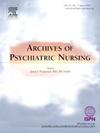Spiritual well-being, depressive symptoms and HIV preventive self-efficacy as predictors of sexual risk behaviors among college students
IF 2.2
4区 医学
Q1 NURSING
引用次数: 0
Abstract
Understanding the psychosocial factors that are associated with young people's sexual risk behaviors is essential for designing targeted and effective HIV prevention programs. College students are particularly vulnerable to engaging in sexual risk behaviors. The aim of this cross-sectional study was to gain insights into whether spiritual well-being, depressive symptoms, and HIV preventive self-efficacy play a predictive role in college students' sexual risk behaviors. A convenience sample of 437 college students who were ages 18 to 24 years and enrolled in undergraduate programs at a public university in the United States were recruited, and several self-administered, reliable, and valid questionnaires were used to collect data. Descriptive statistical analyses, t-test, correlation coefficient analyses, and hierarchical regression were utilized to analyze data. Results indicated higher spiritual well-being was significantly related to higher HIV preventive self-efficacy (r = 0.190, p < .001) and less depressive symptoms (r = −0.618, p < .001). Furthermore, spiritual well-being, HIV preventive self-efficacy, and depressive symptoms together significantly predicted 29.5 % of college students' sexual risk behaviors. This study suggests that spiritual well-being and mental health may play significant roles in HIV prevention. Nurses and healthcare providers may need to consider the influences of mental health and spiritual well-being when designing HIV prevention interventions aimed at boosting self-efficacy and reducing sexual risk behaviors among college students.
大学生精神幸福感、抑郁症状和艾滋病预防自我效能感对性危险行为的影响
了解与年轻人性危险行为相关的社会心理因素对于设计有针对性和有效的艾滋病毒预防方案至关重要。大学生尤其容易发生性危险行为。本研究旨在探讨精神健康、抑郁症状和HIV预防自我效能感是否对大学生的性风险行为有预测作用。本研究选取了437名年龄在18岁至24岁之间的美国公立大学本科学生作为方便样本,并使用了几份可靠有效的自我管理问卷来收集数据。采用描述性统计分析、t检验、相关系数分析、层次回归等方法对数据进行分析。结果显示,较高的精神幸福感与较高的HIV预防自我效能感显著相关(r = 0.190, p <;.001)和较少的抑郁症状(r = - 0.618, p <;措施)。精神幸福感、HIV预防自我效能感和抑郁症状共同预测29.5%的大学生性危险行为。本研究提示精神健康和心理健康可能在艾滋病预防中发挥重要作用。在设计旨在提高大学生自我效能感和减少性风险行为的艾滋病预防干预措施时,护士和医疗保健提供者可能需要考虑心理健康和精神健康的影响。
本文章由计算机程序翻译,如有差异,请以英文原文为准。
求助全文
约1分钟内获得全文
求助全文
来源期刊
CiteScore
3.70
自引率
0.00%
发文量
131
审稿时长
160 days
期刊介绍:
Archives of Psychiatric Nursing disseminates original, peer-reviewed research that is of interest to psychiatric and mental health care nurses. The field is considered in its broadest perspective, including theory, practice and research applications related to all ages, special populations, settings, and interdisciplinary collaborations in both the public and private sectors. Through critical study, expositions, and review of practice, Archives of Psychiatric Nursing is a medium for clinical scholarship to provide theoretical linkages among diverse areas of practice.

 求助内容:
求助内容: 应助结果提醒方式:
应助结果提醒方式:


